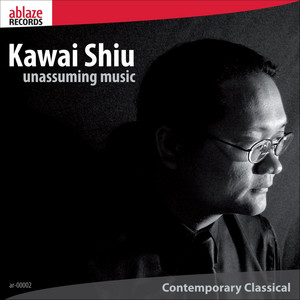
Kawai Shiu Unassuming Music
- 流派:Jazz 爵士
- 语种:英语
- 发行时间:2008-07-01
- 类型:录音室专辑
- 歌曲
- 时长
简介
I am always fond of music for unaccompanied solo instruments, including voice. I like its intimacy and clarity. With the exception of anthem for apep and quartet desire, the present record includes five unaccompanied solo pieces that I composed between 2002 and 2007. Prompted by a slight injury to his left hand, pianist Albert Tiu developed a recital program of right-hand piano music for the 2007 concert season. la coral de una mano alberto was commissioned by him to be included in this program. At the outset, la coral comments on the implied hierarchic constitution in music, especially music from the Western European tradition. This hierarchic constitution is manifested in register, instrumentation, virtuosity, and numerous other musical and contextual parameters. la coral is framed by five six-pitch collections. Each collection and its variants inhabit a specific register of the piano. As the piece progresses the sets transform, interact, and migrate rapidly. Far from echoing the majority of one-hand piano repertoire, la coral neither imitates two-hand piano music nor attempts to woo the listener with five-finger spectacles. It does, however, occasionally require performing chords with six pitches. in keinen wörtern singen wir (for cello), night lay on page (for voice), and no un violín (for viola) are three consecutive movements excerpted from the song cycle de stroom, commissioned by Victoria Zinovieff in memory of her late mother Jennifer Ross. Two major thoughts permeate the cycle: an alternation between instrumental and vocal solo pieces in the cycle, and an unsentimental perception of existence and non-existence. anthem for apep (for horn quintet) was commissioned by my students to enter a competition for wind ensemble. Once again, the event triggered me to think about the issue of hierarchy in western music. Why isn’t there any standard repertoire for horn quintet? I also took the opportunity to introduce the young players to some unfamiliar territories in horn playing, while some others are as ordinary as counterpoint. The flute has always been one of my favorite instruments and it is also one of the most abused instruments in terms of, on the one hand, stereotypical aerial or 'slick' music, and on the other hand, being subjected disproportionately to “overextended” techniques. Being a piece with large formal structure and intricate expression, spiral à outrance is an attempt to pay tribute to the instrument. Commissioned by the South Bank Centre for the Birtwistle’s Games Festival in celebration of the composer’s seventieth birthday, quartet desire is scored, by request, for the same instrumentation as Messiaen’s Quartet for the End of Time. Reminded repeatedly by Harry not to write an occasional piece, something which is never my interest, desire is instead a celebration of some of Birtwistle’s favorite games in music: proliferating elementary materials, interweaving linear and circular progressions, observing various perspectives of a musical object, and staging musical personae. The game of desire is to transform contrasting gestures within a musical context of incessant variations that reaches an amalgamated final. The title is partially borrowed from one of Confucius’ sayings, “At seventy, I follow my heart’s desire yet without transgression.” (Analects: II,iv) Kawai Shiu


![Dreamgirls (Music from the Motion Picture) [Deluxe Edition]](http://y.gtimg.cn/music/photo_new/T002R90x90M000000auXVr4DW8Qf.jpg?max_age=2592000)




